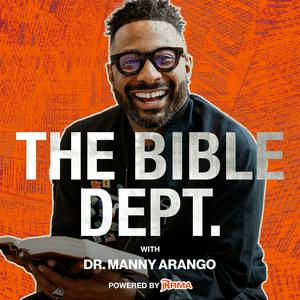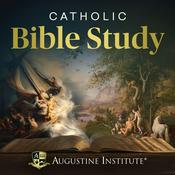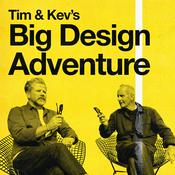372 episodes
- The final chapters of 2 Chronicles cover over 100 years of history—and bring the Old Testament story to a dramatic close. At the center stands Josiah, Judah’s boy-king turned reformer. From temple repairs to rediscovering the Torah, Josiah leads a full-scale revival. But after his death, Judah quickly unravels. Dr. Manny Arango walks us through this final descent—from national reform to exile—and reminds us that the hope of Israel doesn’t rest in a political leader, but in a coming King who will never fail.
✈️ Overview:
• Josiah becomes king at 8 and seeks God personally by age 16
• At 20, he begins purging Judah of idols; by 26, he restores the temple
• The Book of the Law is discovered, sparking covenant renewal
• Josiah celebrates Passover and leads Judah into spiritual revival
• After his death, four kings—Jehoahaz, Jehoiakim, Jehoiachin, and Zedekiah—lead Judah into rebellion and exile
• 2 Chronicles ends with the decree of Cyrus, offering hope of return
🔎 Context Clues:
• Ezra writes these chapters during the exile to call his generation to return and rebuild
• Josiah becomes a spiritual prototype for reform—mirroring what Ezra longs to see in his own day
• The rediscovery of the Law symbolizes both literal and spiritual recovery
• Chronicles skips Josiah’s political failure at Megiddo to focus on his legacy of obedience
• The rapid collapse after Josiah illustrates the need for generational faithfulness, not just individual reform
🤓 Nerdy Nuggets:
• Josiah’s spiritual milestones mirror biblical discipleship: age 16 (seek), 20 (cleanse), 26 (restore)
• Chronicles emphasizes Josiah’s heart posture more than political tactics
• The Torah’s rediscovery comes during temple repairs—highlighting that revival often begins with infrastructure investment
• Huldah the prophetess is consulted, blending written revelation with prophetic insight
• The final verse echoes hope: Cyrus’ decree to rebuild the temple points directly to the story of Ezra–Nehemiah
• Chronicles ends not with despair—but with an open door
✅ Timeless Truths:
• Revival begins with personal seeking before public reform
• God responds to humility—even from a nation on the edge
• A good start isn’t enough—lasting impact requires generational transfer
• Restoration begins with rediscovering God’s Word
• Every ending in Scripture is an invitation to a new beginning
Josiah’s legacy reminds us that young leaders can spark revival, but no human king is enough. As the curtain closes on the Old Testament, God leaves us with hope: the temple can be rebuilt, the people can return, and a better King is coming. That King is Jesus—and tomorrow, we begin again with Day 1: Luke 1–3.
🚀 START HERE!
Want to join us on the journey? Check out the Start Page! You can start from Episode 001 on January 1st or jump in to follow along with us, your choice.
📖 DOWNLOAD THE PLAN:
Whether you’re new to the Bible or ready for a fresh start in 2025, this plan is for YOU. And the best part? The plan is FREE! Download it now and start your journey today.
✅ JOIN THE 6% CLUB:
Did you read your Bible cover to cover this year? We want to know about it! Get your bonuses and exclusive access now. (https://thebibledept.com/club)
🤓 WANT MORE BIBLE NERD RESOURCES?
Check out armacourses.com for biblical literacy resources, courses, and a community to grow with! Learn the Bible for yourself with 60+ courses and counting for only $13 / Month. Also, your first 30 days are on us. Join ARMA for FREE!
🐉 DR.MANNY'S NEW BOOK
Crushing Chaos is available NOW wherever books are sold. Learn more & buy now at https://crushingchaos.com.
👍 NEVER MISS AN EPISODE! LIKE & SUBSCRIBE:
The Bible Dept. | YouTube
The Bible Dept. | Spotify
The Bible Dept. | Apple Podcasts
📱 STAY CONNECTED:
The Bible Dept. | Instagram
The Bible Dept. | Facebook
Dr. Manny Arango | Instagram
ARMA | Instagram
📨 EMAIL US!
Got questions or want to share your thoughts? Email us at [email protected].
💥 MORE RESOURCES:
Amazon Store | Shop The Bible Dept. Essentials
Dr. Manny Arango’s Book | Brainwashed
Book Dr. Manny to Speak
🌱 WE’RE PLANTING A CHURCH!
The Garden | Houston, TX
The Garden | Instagram
The Garden | Facebook
SUBSPLASH:
The Subsplash Platform is the complete solution for connecting with your community on Sunday and beyond. There’s no better way for your church or ministry to engage your audience, grow your giving, or host and stream your media. Learn more at https://subsplash.com/bible-department
Advertising Inquiries: https://redcircle.com/brands - The story of Hezekiah and Manasseh shows us that no one is beyond saving—and no one is above stumbling. In 2 Chronicles 31–33, we see Hezekiah finish his reign with a proud heart despite great victories, while Manasseh, one of Judah’s most wicked kings, becomes the poster child for repentance and restoration. Dr. Manny Arango walks us through spiritual pride, geopolitical pressure, and the mind-blowing grace of God that forgives even the worst of us.
✈️ Overview:
• Hezekiah reforms Judah and withstands the Assyrian siege under Sennacherib
• Hezekiah’s pride leads to a final stumble, showing the danger of spiritual pride
• Manasseh undoes his father’s reforms and becomes the most wicked king in Judah’s history
• Despite his idolatry and violence, Manasseh humbles himself—and God restores him
• Ezra uses these contrasting kings to showcase both covenant warning and radical grace
🔎 Context Clues:
• Assyrian kings (Sargon, Sennacherib, Esarhaddon, Ashurbanipal) drive Judah’s political pressure
• Hezekiah’s rebellion against Assyria nearly costs Judah everything
• Hezekiah’s reforms breach his vassal treaty, sparking Sennacherib’s invasion
• Manasseh’s support of the wrong Assyrian prince lands him imprisoned in Babylon
• Chronicles emphasizes temple worship, suzerain loyalty, and prophetic repentance over politics
🤓 Nerdy Nuggets:
• Hezekiah opens the temple, secures water tunnels, and prepares Judah militarily and spiritually
• He resists Sennacherib’s siege with faith—but becomes prideful after victory
• Chronicles omits Babylonian envoy details but blames pride for Hezekiah’s stumble
• Manasseh commits child sacrifice, sets up idols in the temple, practices divination, and sheds innocent blood
• His repentance (absent in Kings) is a Chronicles-exclusive detail—showcasing shocking divine mercy
• The Apocryphal “Prayer of Manasseh” poetically imagines his confession
✅ Timeless Truths:
• Spiritual pride can grow after success—stay humble in victory
• Your past doesn’t disqualify you from future redemption—repentance rewrites stories
• No one is too far gone for God’s grace—not even kings like Manasseh
• Legacy is shaped not just by your start, but by your finish
• God honors humility—even after rebellion
Even in the darkest chapters of Israel’s history, hope flickers through repentance. Hezekiah’s pride reminds us to finish strong, while Manasseh’s shocking restoration proves that God’s grace truly has no limit. If Manasseh can be forgiven—so can anyone. Let this episode fuel your hope for your own story and for those you’re still praying for.
🚀 START HERE!
Want to join us on the journey? Check out the Start Page! You can start from Episode 001 on January 1st or jump in to follow along with us, your choice.
📖 DOWNLOAD THE PLAN:
Whether you’re new to the Bible or ready for a fresh start in 2025, this plan is for YOU. And the best part? The plan is FREE! Download it now and start your journey today.
✅ JOIN THE 6% CLUB:
Did you read your Bible cover to cover this year? We want to know about it! Get your bonuses and exclusive access now. (https://thebibledept.com/club)
🤓 WANT MORE BIBLE NERD RESOURCES?
Check out armacourses.com for biblical literacy resources, courses, and a community to grow with! Learn the Bible for yourself with 60+ courses and counting for only $13 / Month. Also, your first 30 days are on us. Join ARMA for FREE!
🐉 DR.MANNY'S NEW BOOK
Crushing Chaos is available NOW wherever books are sold. Learn more & buy now at https://crushingchaos.com.
👍 NEVER MISS AN EPISODE! LIKE & SUBSCRIBE:
The Bible Dept. | YouTube
The Bible Dept. | Spotify
The Bible Dept. | Apple Podcasts
📱 STAY CONNECTED:
The Bible Dept. | Instagram
The Bible Dept. | Facebook
Dr. Manny Arango | Instagram
ARMA | Instagram
📨 EMAIL US!
Got questions or want to share your thoughts? Email us at [email protected].
💥 MORE RESOURCES:
Amazon Store | Shop The Bible Dept. Essentials
Dr. Manny Arango’s Book | Brainwashed
Book Dr. Manny to Speak
🌱 WE’RE PLANTING A CHURCH!
The Garden | Houston, TX
The Garden | Instagram
The Garden | Facebook
SUBSPLASH:
The Subsplash Platform is the complete solution for connecting with your community on Sunday and beyond. There’s no better way for your church or ministry to engage your audience, grow your giving, or host and stream your media. Learn more at https://subsplash.com/bible-department
Advertising Inquiries: https://redcircle.com/brands - The story of Hezekiah is a stunning reversal of generational dysfunction. In 2 Chronicles 28–30, we see one of the worst kings in Judah’s history—Ahaz—plunge the nation into darkness, idolatry, and spiritual ruin. But then, his son Hezekiah takes the throne and immediately begins a bold campaign of restoration. He reopens the temple, purifies the priesthood, reinstates Passover, and leads a revival during a time of intense political pressure. Dr. Manny unpacks the contrast between these two kings and reveals the power of starting fresh—even when your past is a mess.
✈️ Overview:
• King Ahaz shuts down the temple and desecrates Judah with pagan worship
• Judah becomes a vassal of Assyria after Ahaz refuses to trust God
• Hezekiah immediately reopens the temple and restores proper worship
• Priests and Levites are re-consecrated; Passover is celebrated again
• Revival breaks out in Jerusalem with joy not seen since Solomon’s day
🔎 Context Clues:
• The Syro-Ephraimatic War sets the stage—Ahaz rejects Isaiah’s call to trust Yahweh
• Ahaz turns to Tiglath-Pileser III (Assyria), forfeiting Judah’s spiritual independence
• Ezra treats the Northern Kingdom (Israel) as a foreign nation—Ahaz’s betrayal is doubly offensive
• Hezekiah’s reforms happen while Judah is still a vassal—heightening the risk and courage involved
• Ezra emphasizes temple loyalty as a litmus test for covenant faithfulness
🤓 Nerdy Nuggets:
• Ahaz is the only king in Chronicles who shuts the temple and builds altars on every street corner
• Chronicles omits Isaiah entirely, focusing instead on temple betrayal as Ahaz’s worst offense
• Hezekiah begins temple restoration on Day 1 of his reign—16 days to cleanse it, just in time for Passover (Numbers 9:9–11)
• Passover is celebrated in the second month due to temple uncleanliness—a legal but rare move
• The text links Hezekiah’s revival directly to the days of Solomon—evoking covenant renewal
• Worship and priestly joy mark the end of chapter 30—God hears their prayers from heaven
✅ Timeless Truths:
• You don’t have to repeat your parents’ mistakes—spiritual legacy can start with you
• One person’s compromise can wreck a generation—but one person’s courage can restore it
• You can reopen what others shut down—revival often starts with repentance and reformation
• Don’t wait for perfect circumstances—Hezekiah led revival while under foreign rule
• God honors obedience over pedigree—your past doesn’t disqualify your present surrender
Hezekiah proves that your starting point doesn’t define your finish. Even as a young king under foreign oppression, he chose to put God first, restore the temple, and unify the people around worship. Let this episode remind you: revival doesn’t wait for ideal conditions—it begins with a yes. Open the doors. Step into purpose. Lead with courage.
🚀 START HERE!
Want to join us on the journey? Check out the Start Page! You can start from Episode 001 on January 1st or jump in to follow along with us, your choice.
📖 DOWNLOAD THE PLAN:
Whether you’re new to the Bible or ready for a fresh start in 2025, this plan is for YOU. And the best part? The plan is FREE! Download it now and start your journey today.
✅ JOIN THE 6% CLUB:
Did you read your Bible cover to cover this year? We want to know about it! Get your bonuses and exclusive access now. (https://thebibledept.com/club)
🤓 WANT MORE BIBLE NERD RESOURCES?
Check out armacourses.com for biblical literacy resources, courses, and a community to grow with! Learn the Bible for yourself with 60+ courses and counting for only $13 / Month. Also, your first 30 days are on us. Join ARMA for FREE!
🐉 DR.MANNY'S NEW BOOK
Crushing Chaos is available NOW wherever books are sold. Learn more & buy now at https://crushingchaos.com.
👍 NEVER MISS AN EPISODE! LIKE & SUBSCRIBE:
The Bible Dept. | YouTube
The Bible Dept. | Spotify
The Bible Dept. | Apple Podcasts
📱 STAY CONNECTED:
The Bible Dept. | Instagram
The Bible Dept. | Facebook
Dr. Manny Arango | Instagram
ARMA | Instagram
📨 EMAIL US!
Got questions or want to share your thoughts? Email us at [email protected].
💥 MORE RESOURCES:
Amazon Store | Shop The Bible Dept. Essentials
Dr. Manny Arango’s Book | Brainwashed
Book Dr. Manny to Speak
🌱 WE’RE PLANTING A CHURCH!
The Garden | Houston, TX
The Garden | Instagram
The Garden | Facebook
SUBSPLASH:
The Subsplash Platform is the complete solution for connecting with your community on Sunday and beyond. There’s no better way for your church or ministry to engage your audience, grow your giving, or host and stream your media. Learn more at https://subsplash.com/bible-department
Advertising Inquiries: https://redcircle.com/brands - The reigns of Amaziah, Uzziah, and Jotham reveal a sobering truth: success doesn’t always mean faithfulness. In 2 Chronicles 25–27, Judah enters a second golden age—expanding territory, growing wealth, and political stability—but not because of wholehearted devotion to God. Dr. Manny Arango unpacks how these three kings were lukewarm and lucky, leading during a season of geopolitical calm while quietly drifting into pride, passivity, and misplaced confidence.
✈️ Overview:
• Amaziah obeys God early—but compromises after military success
• Uzziah reigns for 52 years and prospers until pride leads to his downfall
• Jotham lives righteously but leads passively, failing to reform the nation
• Judah experiences expansion and prosperity during a season of weak external threats
• Success comes through circumstance—not covenant faithfulness
🔎 Context Clues:
• Judah is in recovery after the disaster of Athaliah and the house of Omri
• This era represents a “second golden age” matching David and Solomon’s territorial reach
• Prosperity comes during a lull in Assyrian power—not because of righteousness
• Written prophets like Isaiah and Micah are now active during these reigns
• Ezra emphasizes that success without obedience is spiritually hollow
🤓 Nerdy Nuggets:
• Amaziah “did what was right—but not wholeheartedly” (25:2), signaling divided devotion
• God reminds Amaziah that He can replace lost resources when obedience costs money (25:9)
• Amaziah defeats Edom, then bizarrely worships Edom’s defeated gods
• Uzziah’s pride leads him to violate priestly boundaries—resulting in leprosy
• Jotham avoids corruption but also avoids courageous leadership
• Leadership stalls when character exists without influence
✅ Timeless Truths:
• Not all success is a sign of God’s approval—sometimes it’s just a lucky season
• Pride after victory can undo years of faithfulness
• Passivity is not neutrality—leaders either move things forward or let them slide backward
• Circumstances may bring growth, but only obedience sustains it
• Faithfulness is measured by devotion, not outcomes
Amaziah, Uzziah, and Jotham ruled during a prosperous moment—but prosperity masked spiritual drift. Their stories remind us that growth without obedience is fragile, and success without surrender is misleading. Don’t confuse momentum with maturity. Stay discerning. Lead intentionally. And don’t let luck replace faithfulness.
🚀 START HERE!
Want to join us on the journey? Check out the Start Page! You can start from Episode 001 on January 1st or jump in to follow along with us, your choice.
📖 DOWNLOAD THE PLAN:
Whether you’re new to the Bible or ready for a fresh start in 2025, this plan is for YOU. And the best part? The plan is FREE! Download it now and start your journey today.
✅ JOIN THE 6% CLUB:
Did you read your Bible cover to cover this year? We want to know about it! Get your bonuses and exclusive access now. (https://thebibledept.com/club)
🤓 WANT MORE BIBLE NERD RESOURCES?
Check out armacourses.com for biblical literacy resources, courses, and a community to grow with! Learn the Bible for yourself with 60+ courses and counting for only $13 / Month. Also, your first 30 days are on us. Join ARMA for FREE!
🐉 DR.MANNY'S NEW BOOK
Crushing Chaos is available NOW wherever books are sold. Learn more & buy now at https://crushingchaos.com.
👍 NEVER MISS AN EPISODE! LIKE & SUBSCRIBE:
The Bible Dept. | YouTube
The Bible Dept. | Spotify
The Bible Dept. | Apple Podcasts
📱 STAY CONNECTED:
The Bible Dept. | Instagram
The Bible Dept. | Facebook
Dr. Manny Arango | Instagram
ARMA | Instagram
📨 EMAIL US!
Got questions or want to share your thoughts? Email us at [email protected].
💥 MORE RESOURCES:
Amazon Store | Shop The Bible Dept. Essentials
Dr. Manny Arango’s Book | Brainwashed
Book Dr. Manny to Speak
🌱 WE’RE PLANTING A CHURCH!
The Garden | Houston, TX
The Garden | Instagram
The Garden | Facebook
SUBSPLASH:
The Subsplash Platform is the complete solution for connecting with your community on Sunday and beyond. There’s no better way for your church or ministry to engage your audience, grow your giving, or host and stream your media. Learn more at https://subsplash.com/bible-department
Advertising Inquiries: https://redcircle.com/brands - The story of Joash is a wild tale of hidden heirs, temple coups, and spiritual whiplash. In 2 Chronicles 21–24, Judah spirals from royal assassinations to priest-led reform—all hinging on a single child who was hidden in the temple for six years. God’s covenant with David is nearly destroyed by Athaliah’s demonic reign, but a priest named Jehoiada steps up with courage, covenant, and conviction. Dr. Manny walks us through this rollercoaster of betrayal, revival, and decline—and what it teaches us about leadership, influence, and legacy.
✈️ Overview:
• Jehoram becomes king and kills all his brothers, turning Judah toward idolatry
• Athaliah, daughter of Ahab and Jezebel, influences her son Ahaziah and later seizes the throne herself
• After Ahaziah is assassinated, Athaliah kills the entire royal family—but Joash is secretly hidden by Jehosheba
• Jehoiada the priest organizes a coup, crowns Joash as king at age 7, and leads national reform
• Joash repairs the temple and leads well—until Jehoiada dies, and he abandons the Lord
🔎 Context Clues:
• Ezra’s chronicling of Judah excludes Israel entirely—shining a spotlight on covenant faithfulness
• The only woman to rule Judah is framed as an anti-Messiah figure trying to kill the Davidic line
• Jehoiada isn’t royalty—but his priestly leadership preserves God’s promise and saves the nation
• Ezra centers temple restoration as a sign of spiritual renewal and covenant obedience
• The narrative shift after Jehoiada’s death reveals how dependent Joash was on outside influence
🤓 Nerdy Nuggets:
• Elijah sends a letter to Jehoram after Elijah’s departure—a rare prophetic mic drop from beyond
• Jehoram dies of a gruesome disease—his funeral is dishonorable, and no one mourns
• Jehosheba, wife of the high priest, becomes a hidden hero by saving baby Joash
• Athaliah’s reign mirrors Jezebel’s agenda—an anti-Davidic infiltration of Judah
• Joash uses a collection box (chest with a hole) to fund temple repairs—a rare Old Testament GoFundMe
• Joash turns on Zechariah, Jehoiada’s son, and has him stoned in the temple—foreshadowing future rejection of prophets
✅ Timeless Truths:
• Who influences you matters—your character is revealed when godly voices go silent
• God keeps His promises—even when the enemy tries to kill every last heir
• Hidden obedience (like Jehosheba’s) can change the course of history
• Reform is fragile when it relies solely on leadership, not personal conviction
• Don’t mistake early faithfulness for lifelong integrity—your legacy depends on endurance
From royal murder to radical reform, this episode reminds us that legacy isn’t just about what you build—it’s about who you listen to when the music stops. Don’t just hide in the temple. Be the kind of person who builds it back up, even when no one’s watching. Finish well.
🚀 START HERE!
Want to join us on the journey? Check out the Start Page! You can start from Episode 001 on January 1st or jump in to follow along with us, your choice.
📖 DOWNLOAD THE PLAN:
Whether you’re new to the Bible or ready for a fresh start in 2025, this plan is for YOU. And the best part? The plan is FREE! Download it now and start your journey today.
✅ JOIN THE 6% CLUB:
Did you read your Bible cover to cover this year? We want to know about it! Get your bonuses and exclusive access now. (https://thebibledept.com/club)
🤓 WANT MORE BIBLE NERD RESOURCES?
Check out armacourses.com for biblical literacy resources, courses, and a community to grow with! Learn the Bible for yourself with 60+ courses and counting for only $13 / Month. Also, your first 30 days are on us. Join ARMA for FREE!
🐉 DR.MANNY'S NEW BOOK
Crushing Chaos is available NOW wherever books are sold. Learn more & buy now at https://crushingchaos.com.
👍 NEVER MISS AN EPISODE! LIKE & SUBSCRIBE:
The Bible Dept. | YouTube
The Bible Dept. | Spotify
The Bible Dept. | Apple Podcasts
📱 STAY CONNECTED:
The Bible Dept. | Instagram
The Bible Dept. | Facebook
Dr. Manny Arango | Instagram
ARMA | Instagram
📨 EMAIL US!
Got questions or want to share your thoughts? Email us at [email protected].
💥 MORE RESOURCES:
Amazon Store | Shop The Bible Dept. Essentials
Dr. Manny Arango’s Book | Brainwashed
Book Dr. Manny to Speak
🌱 WE’RE PLANTING A CHURCH!
The Garden | Houston, TX
The Garden | Instagram
The Garden | Facebook
SUBSPLASH:
The Subsplash Platform is the complete solution for connecting with your community on Sunday and beyond. There’s no better way for your church or ministry to engage your audience, grow your giving, or host and stream your media. Learn more at https://subsplash.com/bible-department
Advertising Inquiries: https://redcircle.com/brands
More Arts podcasts
Trending Arts podcasts
About The Bible Dept.
Welcome to The Bible Dept., a 365-day Bible reading plan and podcast with Dr. Manny Arango designed to help you connect with Scripture in a fresh, meaningful way.Did you know that 94% of Christians have never read the entire Bible? We're here to change that! Each day, we guide you through 1–3 chapters of Scripture and dive deep into its meaning with engaging episodes that include:An Overview: Breaking down what’s happening in the text.Context Clues: Exploring historical and cultural insights.Nerdy Nuggets: Fascinating details you might not know.Timeless Truths: Practical takeaways to apply to your daily life.Whether you’re just starting out or looking for a fresh perspective, The Bible Dept. is here to make Scripture approachable, clear, and transformative. Read the Bible this year --- and ACTUALLY get it! Subscribe now and join us on the journey.📖 DOWNLOAD THE PLAN (https://thebibledept.com/plan)🚀 START HERE! (https://thebibledept.com/start-here)
Podcast websiteListen to The Bible Dept., Dish and many other podcasts from around the world with the radio.net app

Get the free radio.net app
- Stations and podcasts to bookmark
- Stream via Wi-Fi or Bluetooth
- Supports Carplay & Android Auto
- Many other app features
Get the free radio.net app
- Stations and podcasts to bookmark
- Stream via Wi-Fi or Bluetooth
- Supports Carplay & Android Auto
- Many other app features


The Bible Dept.
Scan code,
download the app,
start listening.
download the app,
start listening.



































